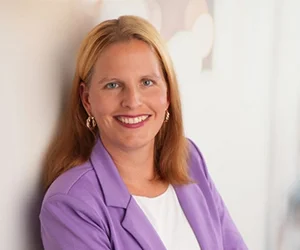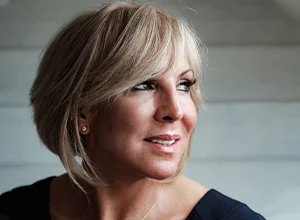- Banque Saudi Fransi emerged as Most Recommended Retail Bank in the Middle East - reaping the benefits of its digital investments
- Commercial International Bank and Emirates NBD voted as Most Recommended Retail Bank in Egypt and UAE respectively
- Abu Dhabi Islamic Bank named Most Helpful Bank during COVID-19 in the Middle East
- Consumers favoured Mashreq Bank for internet banking, Dubai Islamic Bank for home loan and First Abu Dhabi Bank for savings account
The year 2020 has been a challenging period for the retail financial services industry with banks facing pressure to accelerate the delivery of their digital banking promise. Agility to respond to the evolving landscape and creating value-driven relationships with customers have been key differentiators for banks in staying relevant during this unprecedented period.
As part of its BankQuality™ Consumer Survey and Rankings, TAB gathered feedback from consumers in the Middle East on their experience and satisfaction with their retail banks. The BankQuality™ Consumer Survey and Rankings, which involved 3,000 consumers from Egypt, Saudi Arabia and UAE, assesses consumer perception, attitude and loyalty to financial institutions based on their experience with service, channels, products and COVID-19 support initiatives.
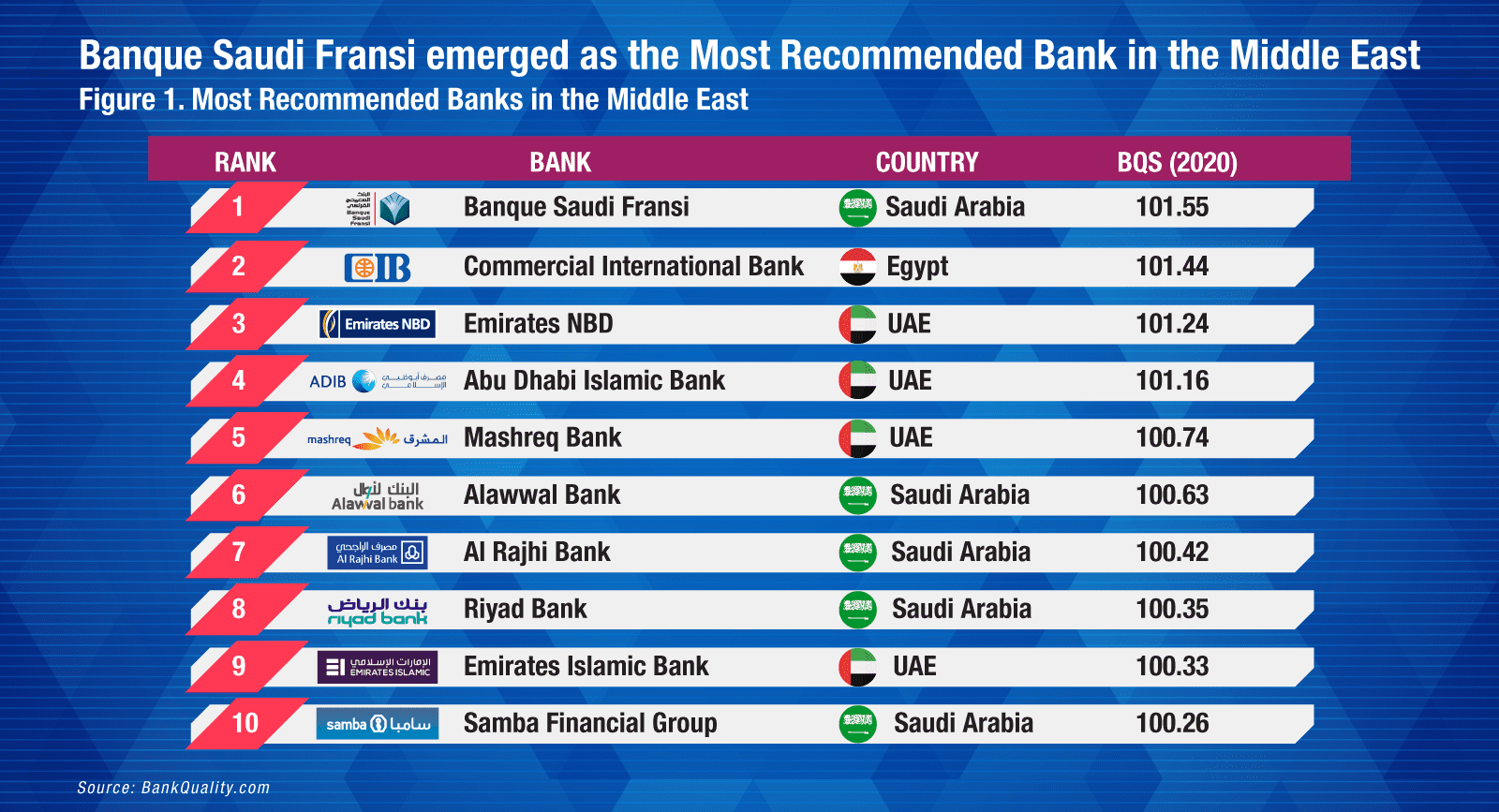
Banque Saudi Fransi emerged as Most Recommended Retail Bank in the Middle East - reaping the benefits of its digital investments
Banque Saudi Fransi (BSF) from the Kingdom of Saudi Arabia (KSA) captured the top spot as the Most Recommended Retail Bank in the Middle East – surpassing more than 60 banks from Egypt, Saudi Arabia and United Arab Emirates (UAE). The bank received a BankQuality™ Score (BQS) of 101.55 for its overall retail banking services.
For more than four decades, BSF has been providing retail financial services to the Kingdom of Saudi Arabia. The bank developed its LEAP five-year strategy in 2018 aiming to become a modern, innovative and experience focused bank. As part of this strategy, the bank made investments in 2019 to digitise customer experience, and execute nimble banking solutions.
The bank introduced online account opening, e-KYC (know your customer) debit cards issuance and eSignature. Thus removing customer friction with 38% of the bank’s new retail account openings done through digital account registration. It also utilised robotic process automation (RPA) to remove manual tasks, reduce risks and automate end-to-end workflows, as well as chatbots to interface with customer engagements.
To stimulate innovation and open banking, BSF supports fintechs and start-ups via direct equity investments, and leverages banking-as-a-service (BaaS) solutions such as Halalah, a digital payments platform.
As a result, the bank also emerged as the Most Recommended Retail Bank in the Middle East for its branch service, relationship managers,asset management and auto loan product. It also surpassed banks in KSA in internet banking, mobile banking, payments, personal loan and savings account. However, consumers gave the bank a lower satisfaction rating for its telephone banking service.
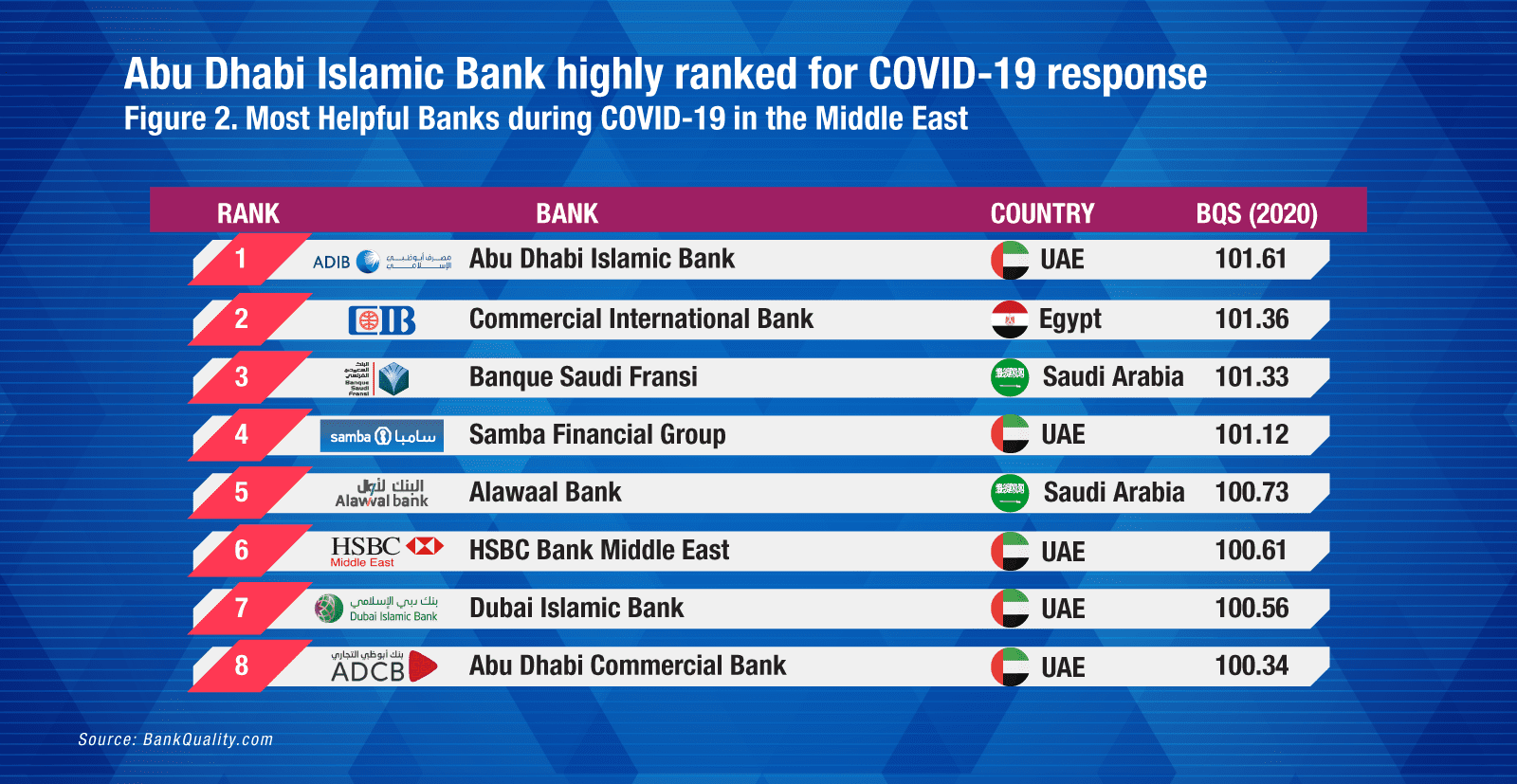
Commercial International Bank and Emirates NBD voted as Most Recommended Retail Bank in Egypt and UAE respectively
Egypt’s Commercial International Bank (CIB) and UAE’s Emirates NBD placed second and third as the Most Recommended Retail Banks ranking in the region, and took the top spot in their respective markets.
CIB, which received a BQS of 101.44, is also the highest rated bank for telephone banking, credit card, and payments in the Middle East. The bank also gained the highest customer satisfaction scores in Egypt for all retail banking channels and services including branches, internet banking, mobile banking, telephone banking and relationship managers. The bank also topped the country-level rankings for various retail financial products and for its COVID-19 response. Consumers noted the bank’s digital services and facilities were helpful during the crisis. “Digital transactions have been greatly improved to become very fast, helping us protect ourselves from the virus.”
Emirates NBD, with an overall BQS score of 101.24, also demonstrated its leadership in mobile banking, personal loan and remittances in the Middle East. The bank is also a country-leader in payments and branch service. The bank has not only been digitally transforming its products and footprint, but has made over 55% of its branches disability friendly through integrated assistive technologies and implementing disability etiquette training (DET) programme for branch staff.
However, improvements can still be made in areas where consumers found lacking such as home loan, telephone banking and relationship managers. Despite having strong digital platforms, consumers rated the bank’s COVID-19 initiatives low – citing reasons such as inconsistent or lack of communication, and issues regarding loan deferment and restructuring.
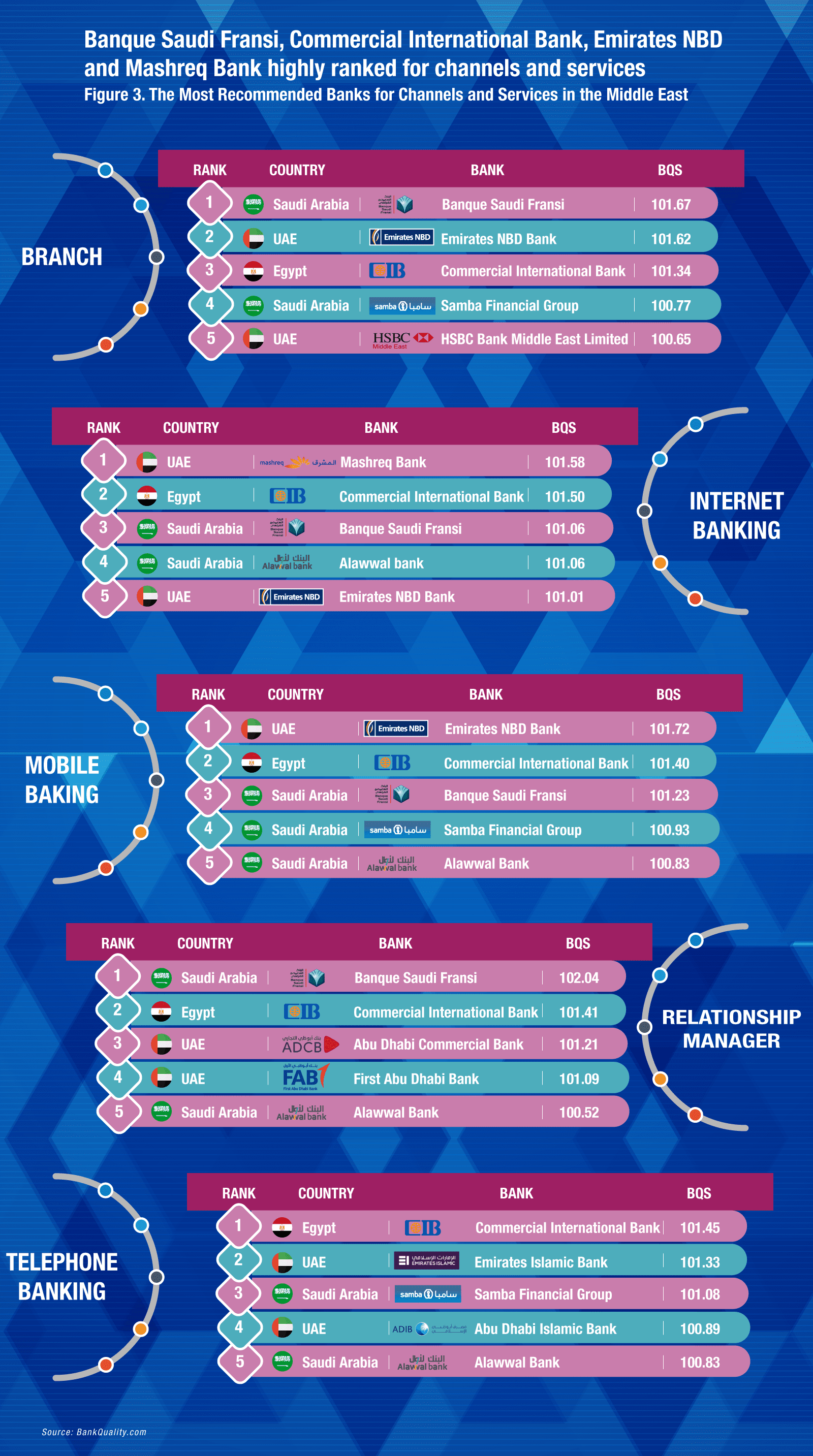
Abu Dhabi Islamic Bank named Most Helpful Bank during COVID-19 in the Middle East
In terms of COVID-19 response, Abu Dhabi Islamic Bank (ADIB) received the highest BQS rating (101.61) among banks in the Middle East, as well as the highest country-level BQS for its relationship managers.
Customers laud the bank for its digital platform, accessibility and communication. Some of the feedback include: “I don’t feel comfortable with cash, so mobile backing really helped”, “the bank is providing many facilities”, “great convenience through digital channels”, “in the current situation, I was using only digital platforms for transactions”, and “24/7 we got updated information from the bank”.
ADIB has introduced multiple measure, including finance installments and repayment deferrals for impacted customers. As part of its relief package, the bank offered 5% cashback on grocery expenditure and utility bills, 5% discount on down payment for home finance, 50% discount on online remittances and cheque book requests for SMEs, free of charge installment plans and free temporary limit increases on cards.
In October 2020, the bank announced that it has seen a sharp rise in digital services usage. The bank reported that 50% of new ADIB customers are on boarded digitally, while 75% of customers have been enrolled to the bank’s digital channels. Digital transactions now account for 94% of ADIB’s total customer interaction, including fund transfers. Meanwhile, 65% of customer updates channeled digitally.
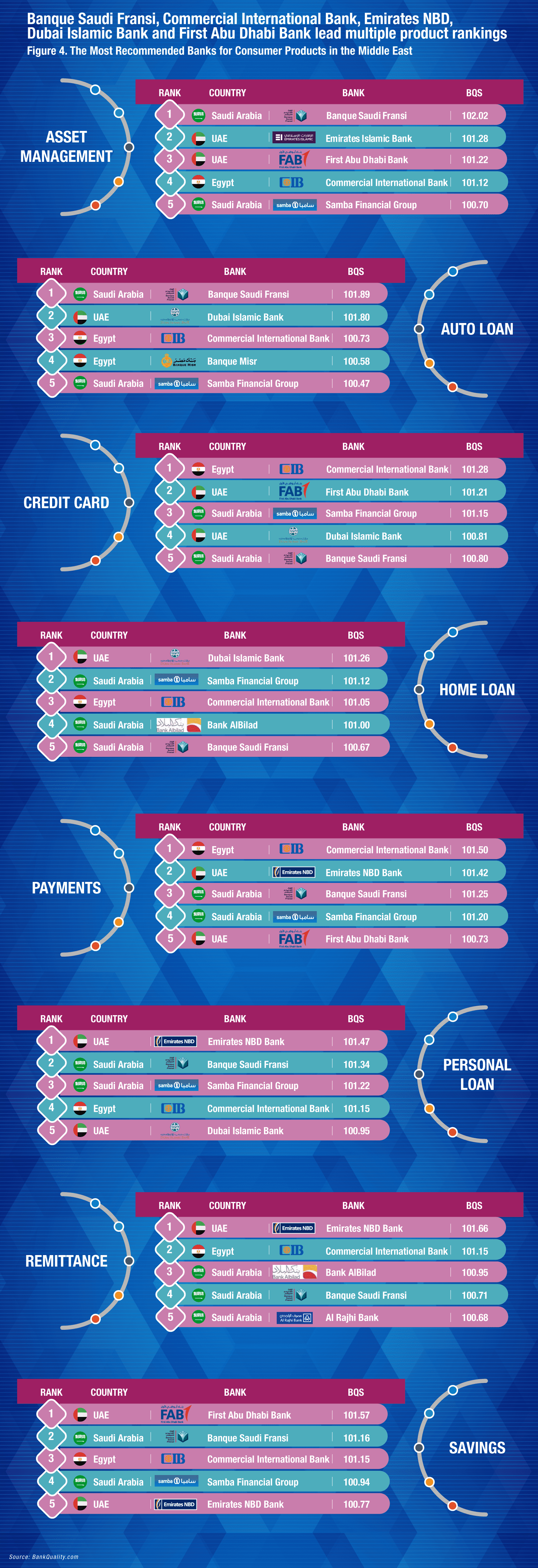
Consumers favoured Mashreq Bank for internet banking, Dubai Islamic Bank for home loan and First Abu Dhabi Bank for savings account
Mashreq Bank earned the highest BQS score for internet banking across Middle East. Last year, the bank reported a 280% increase in cashless transactions between January and July 2019, from which around 5% are contactless payments. The bank also rolled out its new digital engagement banking bot that enables customers to transition to a browser-based chat session with a virtual agent.
Dubai Islamic Bank’s home loan scored the highest among banks in the region with a BQS of 101.26. As of September 2020, home loan was the biggest contributor to the bank’s loan portfolio at 41%. As the home finance market recovers in UAE, the bank was able to capture over $272 million (AED 1 billion) new bookings during the third quarter of 2020.
In terms of savings account, First Abu Dhabi Bank (FAB) surpassed other banks in the region with a BQS of 101.57. The bank offers a range of savings products, as well as instant account opening. In 2019, FAB’s customer deposits grew by 13% year-on-year in 2019.
To view the full ranking, visit https://www.bankquality.com/global-rankings/most-recommended-retail-banks-in-the-middle-east
















